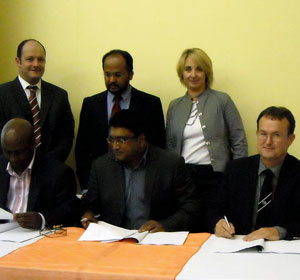
A partnership between UKZN and Karebo Power Projects, a Johannesburg-based engineering company, has resulted in the Integrated Renewable Energy Application Programme (I-REAP). Officially launched at the Westville campus on October 13, the initiative also involves the National Research Foundation (NRF)’s Technology and Human Resources Programme (THRIP), the Industrial Development Corporation (IDC) and UKZN Innovation, the University’s commercial arm.
The realities of climate change demand that South Africa move away from its high (almost 90 percent) reliance on coal for electricity generation to more renewable sources of power. The UKZN-Karebo partnership aims to address this issue by establishing a multidisciplinary Renewable Energy Technology Centre aimed at: promoting excellence in sustainable energy research and technological development, fostering scholarship and skills transfer, and creating and disseminating knowledge on renewable energy.
Speaking at the launch, Dr Pradeep Kumar, Project Director from Karebo, emphasised the importance of finding energy solutions that are sustainable and are technically and commercially viable. “Renewable energy projects need to be commercially viable and innovative and tailor-made technical solutions are required in each case. Hence a collaborative initiative such as I-REAP could help South Africa unlock the value in renewable energy,” he said.
The Renewable Energy Technology Centre will be the first of its kind in southern Africa. Although there is already substantial interest in the renewable energy market in the country, all renewable energy centres in South Africa currently focus primarily on solar or wind power. Instead, the UKZN-Karebo Centre will concentrate on energy from farm waste and will offer specific expertise on the broader field of waste-to-energy.
Leading the project from UKZN’s side is Professor Cristina Trois from the School of Civil Engineering, Surveying and Construction. She comes to the party with more than 10 years’ experience in the field. Her earlier research on biogas production from waste formed the framework for the first biogas-to-energy project in Africa, implemented by the eThekwini Municipality from 2006-2009.
In her welcome address, Professor Trois highlighted the research she and her students have conducted over the years and said that the time is right for the implementation and development phase.
